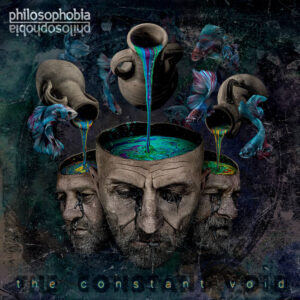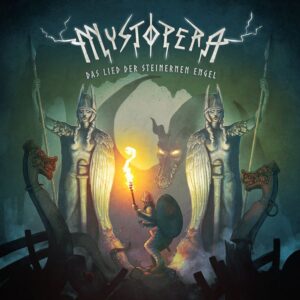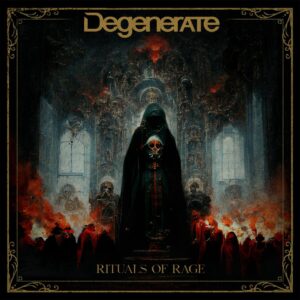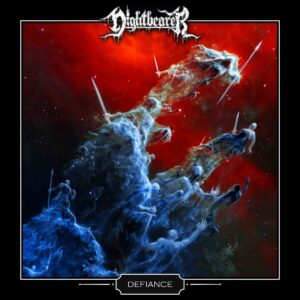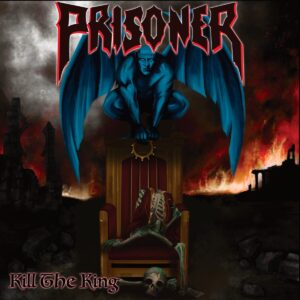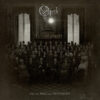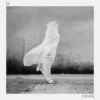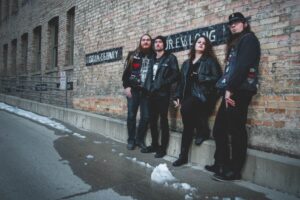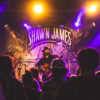Tomi Gottlich
Rebellion
•
February 3, 2018
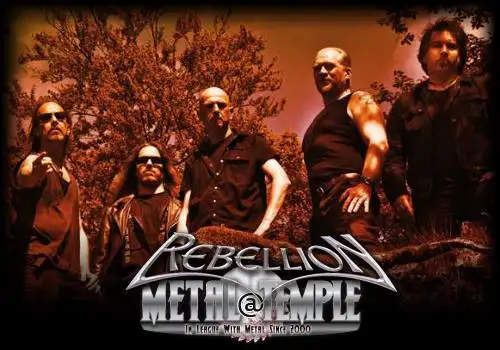
(laughs) Well first of all, I personally like Shakespeare. Second, I think Macbeth, as well as for Lear, concerning topics of the general atmosphere of the plays, most are very well suited just for heavy metal lyrics and songs.
Yeah
Yeah, I read your review! Very, uh, I was very impressed by your review!
Thanks a lot for that, really!
Um… Uh, I don't think I'll live long enough to do that (laughs). Uh, with King Lear, it took me about and a half to two years to complete.
Yeah… I-I really um, I wasn't prepared to do King Lear actually! I wanted to do a third album of Germanic history, and creating another trilogy, but Michael came up with the idea (for King Lear) he probably was sick of historical topics [laughs] saying, "Well, why don't we do Shakespeare? Let's… for example, do King Lear." And I had wanted to do King Lear after Macbeth, but Oliver didn't back the idea so I was easily convinced since I had liked Shakespeare myself.
I think that Shakespeare's works are still read today, received today, and discussed today because they-their topics are the core of human nature, if you want. In Macbeth, it's basically the naked greed, whereas in King Lear, it's treachery… as well with the sisters, as with the sons of Gloucester and the willingness to throw all human ethic – values, if you want – overboard, as long as you can profit from it, if you want. You could interpret it even as like, the cold, naked face of capitalism. I'm not sure, doing [it out of]any greed or I think fear, but in a globalized world where everybody basically seems to only think, "Me first, others second". And I'm not only talking about Mr. Trump, here. In Europe it disguises itself a little better, but basically, we're doing the same thing. So um, the message is they are still valid, and they describe the negative sides of human nature, I think.
(laughs) As you've also mentioned in your review, it's uh… dragons and princesses, and knights! It's just probably like our… You can always do that! (laughs)
Everybody will always buy that! (laughs)
Probably not, no (laughs).
Over two years, actually.
Basically it's just the idea of choosing a topic and then it's-first of all, my job doing a lot of reading. Reading the play, reading what other authors have said about the play. I follow also a bit, the discussions – present discussions – how to receive the play, and how to interpret it, and again, constantly reading the play and sort of… Y'know when you want to put two and a half hours of playing time into sixty minutes of music, you have to leave things away. You have to focus on certain elements and others… keep others out. And to decide what that is, is of course an interpretation of the play, a personal interpretation of the play. And I would want my personal interpretation of Lear to be good enough and to have enough content so that you can discuss it in University, for example. Of course you can attack it, but I want it to have enough content in it that can be attacked, and that somebody says, "I would interpret it otherwise, but I see there's a red line-there's a logic behind this specific interpretation." And to do that, you need to get your own picture. That takes-took me a half a year of reading only until I had sort of an idea of how it could be done. And then of course, you discuss it with the songwriters, with the guitarists and say, "Well, we could do these topics, and that topic, and this should feel musically like that. And this should feel like this." And then sometimes they come up with songs which are… brilliant, and don't really fit where they need to. So sometimes it could change the concept a bit because you think the song is just perfect for the album, so in a way it sort of influences songwriting, and lyrics writing, finding topics, it's a process which-where everything influences everything in a way. I don't want to have a perfect plan before I start to work but I like to keep it open so that new influences get in and to let it be sort of a creative process. And since we're all professional musicians, but just… have ordinary jobs, and families, and houses and gardens. To mow the lawn, y'know. So, we all have normal lives. So we cannot work seven hours a week, we dedicate a lot of time but also we need to take simply a lot of time – talking in years – to find enough time to do good work.
Yeah, I thought that the fool, especially in the first half of the play, is probably the most important person and definitely the most cherished one as you had also written in your review, but I think, I-I don't understand why in the end, he more and more disappears as an acting person. I mean, in medieval times, Fools were often highly intelligent persons and they were like… depending on the King, the only persons who would openly criticize the King, because they would mask their disgust as a joke. And so, this is actually exactly the role the Fool plays here, and in the end, he's the only one who sticks with the King. Everybody else can't-of course can't be mentioned but um… only in disguise. But the Fool is the only one who walks all the way with his King. And in the end, the last scene he doesn't play a role anymore which I… don't understand as-as… But one would have to ask Shakespeare why he did it that way. I mean, talking about Shakespeare's plays, you can never really be sure what we have now is Shakespeare's play, if it was really written by Shakespeare, has this been changed or altered? Because every play has its own history of how it came down to us and some of the themes even in certain plays are questionable whether Shakespeare actually wrote them like that, or whether some other director just integrated that into the play and we all believed it was Shakespeare.
For example, if you take um… in King Lear actually, there's not so much discussions about that among people who investigate literature, but in Macbeth for example, there's the Porter scene, this Porter guy that opens the doors and tells these pretty wild, old jokes about pissing and fucking and not being able to fuck when you've had too much drink, and both of the guys that do research on Shakespeare claim that this scene was not from Shakespeare but was added later just to make it more interesting, and to get a sort of easy laugh from the spectators in those days. We simply don't know!
Exactly.
Umm… That was me… being not quite sober – actually being pretty un-sober – on various substances, and willingly-willingly arrived at the studio. And Ollie [Oliver was like] 'I'm not recording with you in that state!' and I says, 'Yeah, I want to record!' I could hardly talk. And then I did the spoken passages in the beginning of 'Thankless Child' with a maddening [inaudible]of voices, and I wanted to speak those words when I was not sober. So it would sound… like a mad man, if you get my idea, and we had like two battles while recording that because on the one hand, it was Ollie constantly refusing to invest more time, and not understanding I had a clear idea of what I wanted to do (even though I didn't seem quite clear in my mind then) and me trying to convince Ollie to simply do what I tell him to do, and him not understanding what I want because he was being so angry that I would show up (laughs) not sober! (laughs)
In the end, we had another dram of whiskey, and he listened to it and he said, "Well… in the middle of the recording, I began to understand what you actually intended." and it all went well, but the first thirty minutes were… were war. (laughs) But I find conflicts… sometimes add, because they-they create energy, y'know?
(laughs) Yeah, constantly. We discuss constantly, we always-there's never… We're never of the same opinion. In most cases, I decide what to do because it's my band and my authority, but there are quite some cases where I don't always get my way, but Ollie or Stefan have their way, or Michael gets his way, and in the end, often, these are the elements that I like most because it's not my own idea, y'know? So I think that you've been working together for quite some time, there is a bit of a um… trust grows. That, in the end, when I really want something done that way I'll have my way and the others trust me that that's the best way, but there's also quite a lot of situations where, say if someone is very determined, then I'll give it an honest try, and often these experiments turn out very, very well.
Um, I simply don't have time. Rebellion sort of eats up all the time that I have. Besides, I'm a single parent, I have a very young girlfriend, so I need to care for my daughter, I need to care for my household, I need to clean the toilet, I need to do my job, and I only work half time because otherwise I couldn't get anything done. I need to look after my parents which are like… well above eighty, so they need somebody to look after them. So, in the end it's just an ordinary life and whatever's time is left of the ordinary life, I dedicate to Rebellion. And apart of that, I simply… no time…
Bit of a boring answer, I'm sorry! (laughs)
Uh, I think we enjoyed the tour with Running Wild. I think we enjoyed the tour with Udun(?) also… Um, to be honest, memorable was Manowar because they're backstage, private, and completely different from onstage. So we tend to get along with everybody, actually. I think you can have fun with everybody as long as you're like, cool, y'know? We're too old to have topics like, "We're the best, we're the biggest", y'know, "I can play faster than you", I think if everybody is just a little more relaxed, things are a lot easier.
That's no problem! That's no problem, I'll just finish my beer, then.
We have a very small but decent brewery that's basically operated by a single guy. Y'know it's a good beer, uh, a little expensive, the beer, but everything is handmade and it's uh… We're Germans! Used to have the best beer in the world, but we fell well behind America, for example, because you have all those sort of craft beers, and we're just sort of getting the idea of what that means and now we have a lot of little start up breweries here, basically, but it was in your country ten years ago, and I'm really experiencing and trying out all those little small breweries and wasting money on that.
Yeah, I like that, too! In fact, on the last summer I've been in Harris and Lewis, that's in the Outer Hebrides in Scotland, and they even have distilleries there which are completely-have completely weird stuff like in America, and it's strange that if in Germany you have to travel like, to sort of like the edge of the world to find a decent beer, it's funny.
(both laugh) No, but lemme, lemme tell you one thing. I've read a lot of reviews, and there were only two guys that really bothered to pick up the original book and going over it before reviewing the album, and that's um, a lot of determination and the will to understand something and I'm extremely impressed by that.
Uhhhh, to me, in a way yes, because, probably when I'm ready to write a set of lyrics for a specific song, then usually I sit down at about – when my daughter goes to bed at nine, then I'll wait [until]half past nine, I'll sit down and open a good bottle of whiskey, and then, to me, I have to finish that song that evening because otherwise I don't get my stuff done. So, I stay up until I get the lyrics done and this can take two hours, of course I constantly read, get new ideas, read this one, how can I do that? And sometimes it takes four, five, or six hours, so there are, there have been days when I go to bed at three o' clock in the morning and I have to go to work at half past six and then I drive very slowly off to work. Of course, the longer I stay up, the emptier the bottle becomes! [laughs] I'm not-believe me, like alcohol isn't giving you a kick or opening any new creative doors, it's just… y'know I have an open fireplace in my house and it's just nice in front of the fire and I just need to have a whiskey, it just seems to belong together for me. And when I sit there longer-
Exactly! Exactly, and I don't like to mix it with water so um… well, in the morning I still have a bit more than a hangover by then [laughs]!
Sorry?
Yeah, exactly. Exactly (laughs) you got that straight, you're right. But you know, this is how it goes.
Nah, I'm still- I'm an ordinary school teacher. I go to school in the morning.
I teach History and English.
Uh, it's according to the curriculum, of course, but the German curriculum would be a mix if German history, European History, and World History.
So for example, yeah, we teach the Cold War of course, we teach ancient history, of course Roman and Greek History, but we also of course mainly focus on German History. But we also do for example, uh American Dreams.
It's high school.
The students are 16-20.
Yeah. It probably would be 16-18 or 19 but some students repeat a year, of course if their grades aren't good enough…
Yeah, well, we have-normally they're like 16, 17, to 18 is like what we normally have. There are some that are twenty, there are some that are 14 and 15 depending on from which schools they come. Some schools do a year less and students have to work a little more in middle school, y'know? There's a variety here.
Yeah. I mean when I went with GRAVE DIGGER, I used to-I made a living off the music, but when uh, I was about 30 years old, I had to make a decision whether to pursue my university career and finally finish my studies, or just become a professional musician. And do to the… certain conflicts in the band I decided I'd much prefer an ordinary job, and today I'm really happy I made that decision because I can still play my music and I don't have to worry about how the bills are being paid. And I don't rely on anything because I earn my money with my job, and I can play my music as I like it, y'know? For me, music is something… When I left GRAVE DIGGER, I didn't play bass for around three years because I really had forgotten why I once started to play music. Everything was just back (then) 'How many girls can you fuck? Who got drunk, and how much? Who puked in which shoe?' and whatever, and it was brilliant for a while, but after a couple of years, it's just like-
Yeah! And you also miss sort of the stimulus, y'know? And, with this balance I'm quite happy. Of course, I would love to do a big tour and be on the road for a couple of weeks or months on the road, but, you can't have a cake and eat it, so in the end I'll just take whatever comes up. But what I have now is really more than to keep me happy, actually.
Exactly. I work half time as a school teacher so I have lots of freedom, and I'm trying to use that time, or I'm trying to share that time between my band, which is very important for me, but also for my parents which are also very important for me, it's my family, and also my kids which are more important than my parents. So, I really try to divide my time as well as I can, and to make sure everybody, including myself, gets enough of that… But I guess that is what everybody does!
Oh yeah, of course I'd love REBELLION to be more successful, to be able to play bigger stages again, but then again, if I look at how the scene is developed here in Europe, it's… every year it gets more difficult to get good shows, or to get shows at all. Every year you sell less albums and every year money gets less, everybody earns less, so I mean I'm-I'm not a blind dreamer. I know that one band out of thousands has a hit and takes a step forward, but I don't like to be-I don't count on that, yknow? We're doing the best we can, we're offering whatever we have concerning creativity and ideas, and if we can take a large step forward, that's fine, if we cannot, then I will not be unsatisfied, I will not have the feeling that my life has been worthless or that I've missed some chances in my life. I can be very content and very happy if things go unlike they do. If something changes for the better, fine, if something changes for the worse, well then I'll have to handle it.
Aye… And I mean, you can look up to the bigger bands, and say I'd like to be them, but if you want to look down, at the bands that haven't even made it to where we are, then you will finds there's a lot more people down there than when you look up.
I prefer to look, actually, down because then I feel better.
Aye.
I absolutely enjoyed that one, really! It's been a most pleasant evening, actually, my last interview for today, and it's been a nice one and I really enjoyed talking with you, Kyle. I also enjoyed reading your review. Again, I very, very rarely come across somebody who really has so much dedication in trying to get the grasp of the topic and trying to follow ideas that were put into the album. So, again compliments on that.
Definitely. Definitely, compliments on that. And thanks for a very pleasant evening!
Goodnight!
More results...
